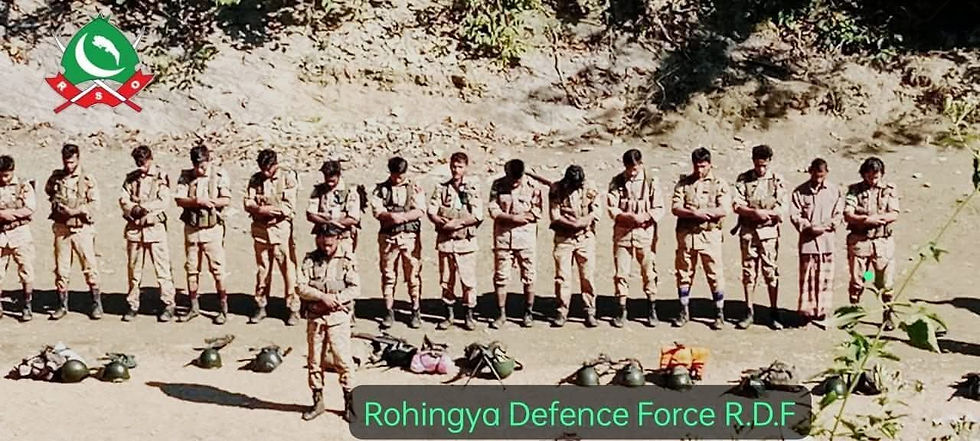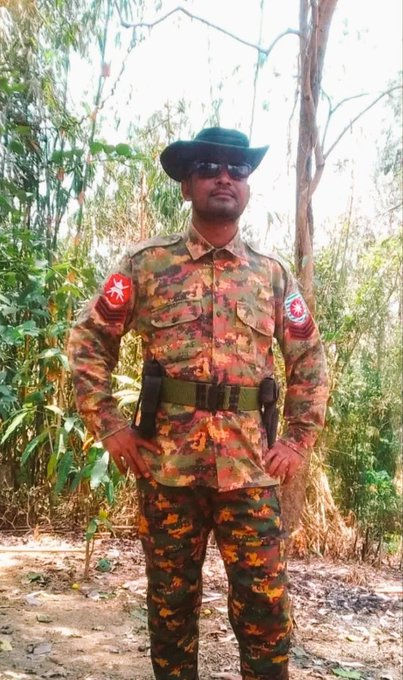Cross-Border Bangagya Terrorist Attacks on the Arakan Army: Undermining Myanmar Peoples' Fight Against Military Dictatorship
- globalarakannetwork

- Sep 29, 2025
- 6 min read
Opinion
Global Arakan Network September 28, 2025

In the fetid haze of the Naf River's delta, where the Bay of Bengal's salt-laced breath mingles with the acrid smoke of smoldering thatch, the frontier between Myanmar's Arakan State and Bangladesh has long been a cauldron of concealed machinations. Here, on September 27, 2025, the Arakan Army (AA)—that indomitable vanguard of Arakan resilience—unveiled a stark indictment: cross-border incursions by Bangagya (Rohingya) terrorist enclaves, spearheaded by the Arakan Bangagya Salvation Army (ARSA) and the Bangagya Solidarity Organisation (RSO), had targeted distant, ostensibly vacant AA outposts along the porous Bangladeshi border.
These were no haphazard forays but orchestrated salvos, a pernicious thread in a tapestry of unrelenting terror. The assailants, flushed from their futile assault and scattered like chaff in the monsoon gale, slunk back into the labyrinthine sprawl of refugee camps in Cox's Bazar—those teeming sanctuaries turned incubators of extremism.
This episode, far from an aberration, exposes the insidious calculus of groups whose fanaticism devours the very cause they purport to champion, undermining the seismic upheaval that has gripped Myanmar since the 2021 coup. In the AA's unyielding campaign for a federal union—a mosaic of ethnic autonomies wrested from the junta's vise—these attacks crystallize a profound betrayal: not merely of arms, but of the people's inexorable march toward emancipation.
To grasp the venom of this perfidy, one must trace its venomous arc back through the blood-soaked annals of Buthidaung and Maungdaw, those northern Arakan bastions where the AA's thunderous offensives have shattered junta fortifications like brittle porcelain. From the outset of Operation 1027 in October 2023, the AA has orchestrated a masterstroke of asymmetric warfare, encircling and eviscerating junta garrisons with the precision of a surgeon's scalpel.
By mid-2025, they commanded over 90 percent of Arakan, including Maungdaw Township, where the Mayu Mountains serve as both sentinel and slaughterhouse. Yet, amid this inexorable advance, ARSA and RSO—those spectral phantoms of Bangagya militancy—emerged not as reluctant bystanders but as eager confederates of the regime they once decried.
Reports from the frontlines paint a tableau of unholy alliance: ARSA fighters, clad in the junta's castoff fatigues, flanking Myanmar junta columns in ambushes against AA positions; RSO operatives, their ranks swollen by coerced conscripts from Bangladeshi camps, laying improvised explosives along AA supply routes. In the crucible of Buthidaung's rice paddies, where the AA's artillery etched verdicts into the earth, these groups fought shoulder-to-shoulder with the very butchers who orchestrated the 2017 genocide—those architects of mass graves and torched villages that displaced a million souls across the border.
This collaboration was no expedient dalliance but a doctrinal convergence, forged in the fires of sectarian zealotry that views Arakanese Buddhists as interlopers on "ancestral" soil. ARSA, reborn from the ashes of Harakah al-Yaqin in 2016, has devolved into a syndicate of predation, its cadres preying on Bangagya kin with the ferocity of a jackal pack.
United Nations dispatches from June 2025 lay bare their depravity: the forcible enlistment of 150 child soldiers, in tacit pact with the Myanmarjunta, to swell their ranks; the summary execution of camp elders like Mohammad Ebadullah in Kutupalong, slain for daring to whisper of repatriation. RSO, that geriatric specter resuscitated from 1980s irrelevance, mirrors this savagery—kidnapping youths for ransom, torching rival enclaves in internecine bloodbaths that claimed scores in Cox's Bazar alone.

As the AA's juggernaut rendered Maungdaw untenable for junta holdouts by early 2025, these factions did not scatter in principled retreat. No—they burrowed into the refugee labyrinths of Bangladesh, those sprawling megacities of despair housing over a million displaced Bangagya, transforming aid corridors into armories.
From these shadowed redoubts, they orchestrate border raids: snipers picking off non-Muslim villagers—Hindus and Mro minorities, whose hamlets dot the Naf's eastern banks—in a grotesque mosaic of ethnic cleansing inverted. A July 2025 skirmish in the Mayu foothills saw ARSA ambuscade an AA patrol, leaving three Arakan fighters slain and a dozen civilians caught in the crossfire, their bodies retrieved from the river's muddy embrace. Such atrocities are not footnotes but the very lexicon of their insurgency, a lexicon that devours innocents while cloaking itself in the rhetoric of liberation.
Lurking beneath this theater of shadows is a more insidious scaffold: the complicity of state actors whose myopia sustains the storm. Whispers from AA intelligence, corroborated by exiled analysts, reveal the Myanmar junta's naval flotillas—those rusting hulks patrolling the Arakan coast's inky depths—ferrying crates of Kalashnikovs and RPGs under the cover of night to ARSA handlers near Teknaf. These armaments, smuggled via Sittwe's besieged harbors, find their way across the Naf, where Border Guard Bangladesh (BGB) sentinels—those ostensibly neutral wardens of the frontier—turn a blind eye or worse, extend logistical succor.
AA Commander-in-Chief Major General Twan Mrat Naing, in a searing September 23 dispatch to The Irrawaddy, excoriated "fanatical elements" within the BGB for inciting these forays, alleging safe houses in Balukhali camp where RSO plotters map incursions with Bangladeshi-issued maps. This is no mere negligence but a geopolitical sleight-of-hand: Dhaka's policymakers, ensnared in the quagmire of hosting a million refugees, appease radical fringes to forestall camp unrest, unwittingly—or perhaps willfully—bolstering Naypyidaw's divide-and-rule stratagem.
The junta, its ranks decimated and coffers bled dry by nationwide resistance, exploits this fissure like a master puppeteer, funneling materiel through Bangagya proxies to harry the AA's flanks. A February 2025 International Crisis Group briefing underscored the peril: such entanglements risk a "drift into further conflict," where border skirmishes metastasize into full-spectrum conflagration.
At its core, this nexus of terror constitutes a cataclysmic betrayal of the people's revolution—a revolution that, since the coup's crimson dawn, has fused disparate insurgencies into a federalist clarion call. The AA embodies this ethos: not a parochial fiefdom, but a disciplined force sworn to the Nationwide Alliance's vision of equitable devolution, where Arakan autonomy interlaces with Shan, Karen, and Kachin aspirations in a tapestry of shared sovereignty.
Their code—rooted in Geneva Conventions and communal equity—stands in stark relief to the jihadist fervor of ARSA and RSO, whose charters echo the shrill anthems of transnational caliphates, from Lashkar-e-Taiba's Pakistani nurseries to Al-Qaeda's spectral imprimaturs. In aligning with the Myanmar junta—the very hydra whose 2017 pogroms birthed the refugee deluge—these Bangagya brigands forsake the arc of justice.
They stand athwart history's inexorable tide, propping up a dictatorship whose depredations have claimed over 5,000 lives and displaced millions since 2021. This is fratricide by proxy: every bullet fired at AA sentinels ricochets against the Bangagya's own repatriation dreams, entrenching exile in perpetuity. Dhaka's strategic myopia compounds the felony; by courting these vipers to manage camp volatility, Bangladesh's mandarins court blowback—a radicalized frontier that imperils its own fragile democracy, as evidenced by the Rapid Action Battalion's futile sweeps that netted ARSA chieftains Ataullah abu Ammar Jununi in March 2025, only for successors to sprout like weeds.

The repercussions ripple far beyond the Naf's brackish currents, etching fault lines in Southeast Asia's geopolitical bedrock. India's Kaladan Multi-Modal Transit Transport Project— that vital artery linking Kolkata to Sittwe's deep-water port—teeters on the precipice, its corridors menaced by AA-Bangagya crossfire that could choke supply lines and embolden Beijing's encroachments via the China-Myanmar Economic Corridor. For the Bangagya masses, ensnared in camps where ARSA's shadow extorts "taxes" from meager rations, this betrayal is existential: a perversion of victimhood into vanguardism that alienates potential Arakan allies in the quest for dignified return.
The AA, for its part, has extended olive branches—evacuation edicts sparing civilians in Maungdaw's siege, overtures to moderate Bangagya voices for joint governance—but these are spurned by the zealots' echo chamber. Retribution looms, inexorable as the tides: history's ledger, stained with the ink of forgotten genocides, will demand reckoning. The Bangagya groups, ensconced in their Bangladeshi lairs, court obsolescence—not from AA bayonets alone, but from the opprobrium of a global conscience that tires of proxy pogroms.
Yet, amid this maelstrom, glimmers of rectification persist. The AA's September 19 vow to fortify Arakan's ramparts against "lawlessness and terrorist activities" signals a proactive bulwark: enhanced patrols, community militias fusing Arakan and sympathetic Bangagya, and diplomatic salvos urging Dhaka to dismantle radical sanctuaries.
Bangladesh, chastened by the fiscal hemorrhage of refugee stewardship—over $1 billion annually—must recalibrate: sever BGB complicity, empower UN-monitored deradicalization, and forge bilateral pacts with the ULA for phased repatriation. Only thus can the revolution's flame, kindled in Yangon's streets and Arakan's hills, consume the junta's husk without devouring the borderlands in collateral pyre.
In the end, the Bangagya assaults are not mere border squabbles but harbingers of a forked path: one toward federal concord, where ethnic mosaics coalesce against tyranny; the other, a vortex of sectarian entropy that resurrects 2017's horrors in perpetuity. The people's revolution— that thunderous chorus of 2021's Spring Revolution—demands fealty to the former. To side with the junta's phantoms is to whisper allegiance to the gallows; history, that stern archivist, will exact its due. Let the Bangagya brigands heed the Naf's sullen murmur: betrayal's wages are paid in full, and the ledger balances in blood.




_edited.png)


